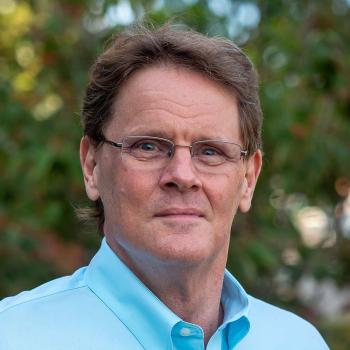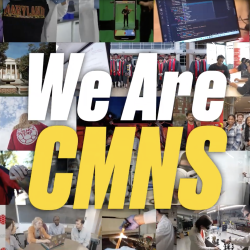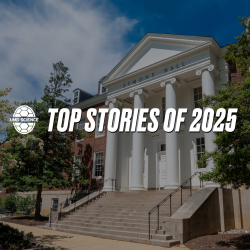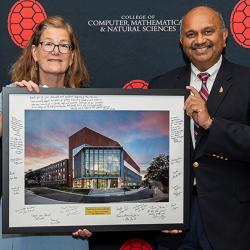‘It’s Been a Good Ride’: Michael Montague-Smith Retiring in August 2023
The principal lecturer and director of undergraduate studies for the Department of Chemistry and Biochemistry reflects on life and his nearly two decades at UMD
-

Michael Montague-Smith has taught and advised thousands of students during his nearly 30-year career in academia. He spent most of those years in the University of Maryland’s Department of Chemistry and Biochemistry, where he has taught classes—most recently as a principal lecturer—and served as the director of undergraduate studies since 2004.
In the lead-up to Montague-Smith’s retirement in August 2023, he sat down for an interview with UMD’s College of Computer, Mathematical, and Natural Sciences and shared a favorite teaching memory, his adventurous retirement plans and his views on the value of humor in the classroom.
This interview has been edited for length and clarity.
When did you first take an interest in chemistry?
I received a chemistry set when I was about 8 years old. I didn’t understand the actual chemistry, but playing with it was a blast—messing with the glassware, combining things, seeing what they would do. I eventually took chemistry in high school and that was my first introduction to the realities of chemistry. I liked it quite a bit.
Over the years, your travels have taken you to Micronesia, Hawaii, Colorado, Oregon and North Carolina—how did that come about?
I was born in New York near Niagara Falls, but my family moved to Guam when I was about 5, then to the Palau Islands when I was 11 and finally to Saipan—an island north of Guam in Micronesia—when I was 13. At the time, Saipan was part of the Trust Territory of the Pacific Islands, and my father worked for the U.S. Department of the Interior. The standard procedure in those days for kids of expatriate Americans was to go to high school abroad. There were several options, but basically it involved going to Hawaii or to Japan, and I chose a boarding school in Honolulu.
After graduating high school, I went to the University of Colorado Boulder to study molecular biology. Before I moved to the mainland, I had never been out of the tropics or seen snow before—at least not that I could remember—so the cold was quite a shock. My path through undergrad was not linear, and I took some time off to work in electronics, construction and restaurants. I even lived in a tipi in Northern California for a while. Eventually, I went back to school, finished my degree and started grad school, ultimately earning a master’s degree and Ph.D. in chemistry from the University of Oregon. After that, I moved to North Carolina for a postdoc at Duke University and ended up staying there for nine years.
Did you always want to work in academia?
No, after grad school I was exploring a number of options. I looked at industrial positions. I applied to a couple of government posts, and I even looked at high school teaching jobs. At some point, I thought I’d wind up working at a small liberal arts college, where I’d wear a tweed jacket with elbow patches.
But in 1997, the chemistry department at Duke University asked me to teach organic chemistry as a visiting assistant professor. I discovered I really liked the dynamic of a big class—the theater of it. So I kept doing it, and after three years they hired me as a lecturer. I did that for another four years before I came to UMD.
What has been your favorite teaching moment over the years?
When I was a graduate student, I had a fellowship with the Department of Education called GAANN, which stands for Graduate Assistance in Areas of National Need. I was required to teach chemistry tutorials to undergraduate students, and one day I was teaching an aspect of NMR spectroscopy called spin-spin splitting. I had planned what I was going to talk about, so I went up to the board and made my pitch, but when I turned around it was clear that none of the students had gotten it. I came up with another way to explain it, but they still didn’t understand.
So I thought about it and came up with a third way. When I looked at the class, it was like these little light bulbs went “Bing, bing, bing!” and someone said, “Is that all there is to it?” I’ve never forgotten that. You have to think on your feet and come up with a different way to explain something, and it feels really good when they finally get it.
Past students have said that you make your classes fun by sprinkling in jokes and personal stories. What is the value of humor as a learning tool?
I would rather have kids come to class wondering what I’m going to talk about—and maybe learn a little organic chemistry along the way—than be bored to tears. The problem with many subjects is that people don’t see any justification for learning them. The fact of the matter is that we are all just a bunch of organic reactions in a big, watery bag. Organic chemistry is incredibly relevant, but sometimes trying to get that across is lost in the details.
I’ve always tried to make chemistry relevant, and if making students laugh helps them remember something, that’s cool too. A student once wrote in my evaluation that my class was 5% standup comedy and 95% hardcore organic chemistry, and I’m OK with that.
Can you give an example of a chemistry lesson that relates to your personal life?
There’s an inorganic compound called potassium permanganate, which has a bright purple color. When I was a kid living on Guam, I got a coral infection on my arm, and you can still see the scar. It turns out that the way they treat coral infections—or at least the way they did it back then—was to paint it with a potassium permanganate solution. It burned and it itched, but eventually it killed off that coral infection.
Most students will never have any connection to potassium permanganate, even though it’s used medically all over the world. If my foolish little story can help illustrate that, I think it’s worthwhile.
What are your key responsibilities as director of undergraduate programs?
A lot of my job is problem-solving. There are a number of scheduled things that have to happen every year to keep the machine running, and there are always issues that come up. There’s a certain satisfaction in fixing a problem and knowing it’s resolved.
When I first got to UMD, one of my major tasks was reorganizing the advising system, and I think we’ve put a system in place that’s worked pretty well. We have a group of core advisors in the department who take care of a sizable chunk of the undergraduate majors, and I do the rest. Typically, I advise about 100 students per semester, and for a period of about two years, I advised 200 students per semester.
How have you seen the Department of Chemistry and Biochemistry change over the years?
Since 2004, the number of chemistry and biochemistry majors, the sheer number of people taking chemistry and biochemistry classes, and the number of class sections that we offer each term have all gone way up. In 2004, 55 bachelor's degrees were awarded in chemistry and biochemistry. Last year, we awarded 99. In addition, the fraction of our graduates and majors who are women and minorities has more than doubled since I arrived. While I like to imagine that revising our advising system—one of my first projects—contributed to those gains, I suspect there are complex changes to university policies and to society broadly that have had large impacts as well.
How do you plan to spend your time in retirement?
One of the challenges for the next year will be figuring out what to do next so that I don’t spend all my time throwing socks at the TV screen. I worked for a while as a woodworker and made custom furniture, so I think I’ll do some woodworking in my little shop at home.
I like to read and listen to music. I play bass, but not well. After I retire and spend a few months decompressing, taking bass lessons could be fun.
My kid—who graduated from UMD with a degree in computer science—also invited me to drive up to Alaska with him in August. It’s a long drive, but by all accounts, the scenery is pretty cool.
And then it’s possible that we’ll go to Saipan next January. My son expressed an interest in visiting because he has heard so many stories about the place. I haven’t been to Saipan since the day I left in 1974, but there are places—on Google Street View, anyway—that look very much like they did back then.
When you look back at your career, what are you most proud of?
I’m not sure there’s one thing, but there are lots of little ones. At the end of the day, I’d like to think I made a positive contribution to some kids’ lives and the chemistry undergraduate program got better during my time at UMD.
When I look back, I’m not sure exactly what series of decisions resulted in me spending 20 years at UMD, but it’s been a good ride. Every job—everything in life, really—has good things and bad things. And if the good things outweigh the bad things, you win. I feel like this was a win.
Written by Emily Nunez






